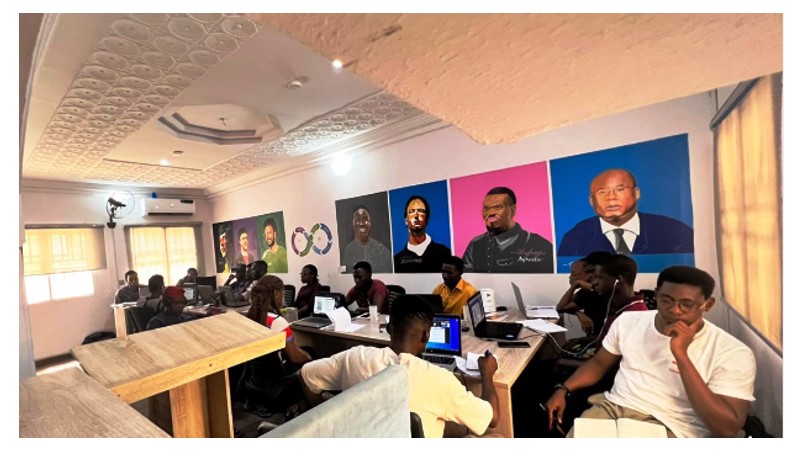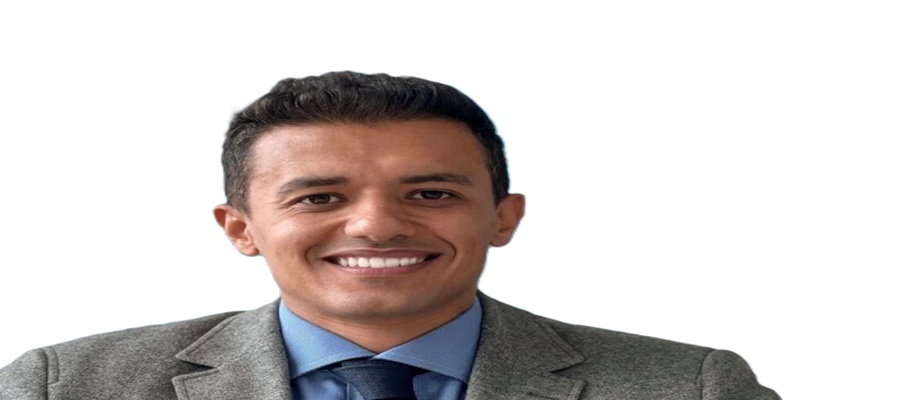Telecom
Tezza Academy Expands Industry Partnerships to Bridge IT Skill Gaps

Tezza Academy is taking strategic steps to broaden its industry partnerships and enhance its IT training model. The software training academy aims to foster collaborations with key economic players across various sectors such as oil and gas, IT and telecoms, banking and insurance, healthcare and education, manufacturing, and construction.

These partnerships are intended to facilitate discussions on incorporating trained IT skill sets and creating more opportunities for talented Nigerian youths with advanced IT skills.
Under the leadership of its founder, Roland Omoresemi, Tezza Academy commenced operations in November 2020, building upon the foundations of Tezza Boot Camp.
Initially admitting 20 young Nigerians, the academy provides a comprehensive curriculum that encompasses cutting-edge technologies, industry best practices, and soft skills training.
“Our agenda is to equip these young Nigerians with the necessary tools to excel in the global market and transform them into IT consultants while nurturing their roots in their homeland,” stated Omoresemi.
“It is important that we focus on building essential collaborations to attract and retain these highly skilled professionals, whether it is at Dangote Refinery, Zenith Bank, MTN or other prominent organizations within Nigeria and beyond,” emphasized Omoresemi.
He said the sustainability of Tezza Academy relies on the partnerships it forges, and the absorption of trained skill sets across sectors, both locally and globally.
As the academy prepares to welcome a new cohort of trainees, it aims to effectively address the challenges of unemployment and employability by placing graduates at client sites.
Originally established as Tezza Boot Camp in November 2020, Lagos based Tezza Academy has rapidly evolved into a premier institution for transforming young talents into highly skilled IT consultants. Based in Lagos, the academy offers a tuition-free residency training program that guarantees job placements upon the completion of an intensive three-month training course.
Tezza Academy’s focus on imparting IT skills aligns with its broader objective of strengthening Nigeria’s high-end Global Value Chains (GVCs) and positioning the country as a major exporter of human capital, potentially rivalling populous nations like China and India.
“Our immersive program structure enables our trainees to cross-develop and establish firm bonds and alliances to ensure our team of professionals always reflect the best versions of themselves,” said Tezza’s Managing Partner, Jide Modele.
Adding: As part of our core ethos, the principles governing the consulting practice as a trusted advisor are taught, learned, and owned by all our trainees.”
A PWC report titled “Nigerian Brain Exports: The Optimal Path to Growing the Nigerian Economy” emphasizes the importance of exporting brain capital and active participation in GVCs as the country’s pathway to development.
The report paints an encouraging scenario in which Nigeria captures 17% of global programming and software development jobs, generating an estimated $50 billion in earnings for Nigerians.
Tezza Academy’s training approach involves introducing trainees to software testing and subsequently placing them in a Mentoring Program, where they can shadow experts for a period of two to three months. Afterward, they can embark on their own careers as software testers.
“In addition to acquiring technical skills, the core objectives of our curriculum are to develop Thought Leaders and Subject Matter Experts in our areas of specialization for our clients globally,” stated Modele.
Modele proudly shares the success stories of the academy’s first cohort, stating, “Every single one who went through that first class has actually been placed at a client site.
“All of them have been fully engaged, and all of them were engaged even before they graduated from the academy.
“So, by way of success stories, all 20 participants of the first cohort were 100% placed at client sites, and their placements were secured even before they completed their training at the academy.”
Additionally, Modele highlighted the significant benefits of Tezza Academy, including the provision of accommodation and a conducive learning environment.
“One of the significant benefits and value propositions of the academy is to ensure that all trainees can live, breathe, eat, learn, and develop within the same facility under one roof,” he added.
Tezza Academy goes beyond merely addressing the skills gap; its vision encompasses connecting all stakeholders to strengthen the entire value chain of a robust digital economy.
This includes building the capacity of young people and preparing them for local and global opportunities, fostering industry collaborations, and expanding job placement opportunities across sectors such as oil and gas, healthcare, education, fintech, telecommunications and more.
Telecom
FG Expands 3MTT Programme Across the Country

Dr Bosun Tijani, Nigeria’s minister of communications, innovation, and digital economy, has revealed that the federal government’s 3 Million Technical Talent (3MTT) programme has trained over 135,000 citizens as it moves from pilot to national level.

Tijani announced this in an update on the program’s success, stating that the beneficiaries were trained in three batches.
He also stated that the initiative’s community-based learning tools had provided over 300,000 extra learners with access to digital skills training across the country.
According to the minister, the program has also enabled the creation of about 15,000 job, entrepreneurship, and career development in Nigeria’s developing digital economy.
He further revealed that more than 1.8 million Nigerians are currently in the 3MTT pipeline, as the government works toward its target of equipping three million citizens with in-demand digital skills aligned with local and global labour market needs.
As the programme enters its scale-up phase, Tijani said the government’s focus will shift toward deepening impact rather than just expanding numbers.
Key priorities, he explained, include strengthening the 3MTT alumni community, widening access to economic opportunities and ensuring that skills acquired through the programme translate into measurable outcomes such as jobs, business creation and innovation.
To support this phase, the federal government has introduced the #3MTTImpactChallenge, an initiative aimed at assessing the programme’s real-world impact
Through the challenge, fellows and partners are invited to share personal stories on how 3MTT has shaped their professional journeys as part of a National Impact Reflection exercise.
Participants are expected to share their experiences across social media platforms, with selected winners set to receive prizes including laptops, e-tablets, data bundles and other incentives.
Telecom
Spacecoin Secures Licenses to Roll Out Satellite Connectivity in Nigeria, Kenya

Spacecoin, US-based, has announced the signing of recent agreements with local authorities and operators to launch satellite connectivity pilot projects in Africa.

The initiatives, focused on Kenya and Nigeria, aim to serve areas where terrestrial networks remain limited or unavailable.
n Kenya, Spacecoin has obtained a transmission license from the Communications Authority, allowing it to test satellite-based solutions for connectivity and Internet of Things (IoT) monitoring, particularly in rural and peri-urban areas with limited internet access.
According to the Kenyan regulator, internet penetration remains below 50% of the population, despite mobile penetration exceeding 130%.
In parallel, the company is continuing operations in Nigeria under an existing license issued by the Nigerian Communications Commission (NCC).
This authorization supports initiatives aimed at delivering affordable broadband connectivity to isolated and underserved communities.
Spacecoin’s approach is based on a decentralized satellite network using nanosatellites in low Earth orbit (LEO).
Combined with blockchain-based protocols, this architecture is intended to offer more flexible and cost-effective connectivity services than traditional networks, while also enabling the integration of IoT solutions for a range of uses, from smart agriculture to infrastructure monitoring.
These projects are part of a broader strategy to help narrow Africa’s digital divide, where a significant share of the population still lacks access to reliable internet services.
Satellite technology is increasingly viewed as a complement to terrestrial infrastructure, particularly in hard-to-reach areas where deployment costs and geographic constraints remain high.
Beyond Africa, Spacecoin is also running pilot projects in Asia, working with local partners to test the viability of its model across different regulatory and geographic environments.
According to the company’s management, growing interest from regulators reflects a shift toward solutions capable of reaching populations that have long been excluded from internet access.
Telecom
AVEVA Names Khaled Salah Vice President for Africa to Drive Growth

AVEVA, a global leader in industrial software, driving digital transformation and sustainability, today announces the appointment of Khaled Salah, 37 years old, as Vice President of Africa.

Khaled Salah
In this new role, he will be responsible for about 30 employees to ensure the successful implementation of AVEVA’s growth strategy. Khaled Salah will report directly to Jesus Hernandez, SVP of the EMEA region.
A 15-years + career across different industries and domains
With a MBA in management from the Warwick business school, UK, and a master’s degree in engineering from Ain Shams university in Egypt, Khaled Salah is an active advocate for driving sustainable progress in the industrial sector. With Sustainability in mind, Khaled is keen on making a positive business impact, while fostering progress for people and the planet.
He started his career at Schneider Electric, in 2013 in the global supply chain and evolved through various roles such as Europe procurement and supply chain strategy Manager, and Global Commercial strategy Director for the industrial automation business. Khaled Salah has developed a strategic understanding of all those fields.
After 12 years in Schneider Electric, Khaled joined AVEVA in 2022 to lead AVEVA and Schneider Electric global strategic partnership, across all industries managing a team of 30 people.
He has led the introduction of new AVEVA software solutions to initiate and develop significant growth areas across all Schneider Electric verticals.
Ambitious plans for AVEVA in Africa
In addition to his current role as AVEVA and Schneider Electric partnership Vice-President, Khaled now takes over the management of AVEVA’s activities in Africa.
Jesus Hernandez, SVP of the EMEA region says: “Africa is a strategic region for AVEVA. In this major industrial market, customers, world leaders in the fields of Energy, Metal & Mining, Chemicals, and Water, are looking for AVEVA’s expertise to accelerate and drive their digital transformation and sustainability strategies, as well as their energy transition projects.
“Khaled Salah’s qualities of leadership in a global environment will benefit his team spread across 12 countries including Algeria, Morocco, Egypt, Kenya, Nigeria, and South Africa.”
Motivated by the prospect of capitalizing on the talent of his team to strengthen AVEVA’s presence in Africa in the years to come, Khaled Salah says: “Helping my team realize their professional potential is close to my heart.
“We will work together to support and accelerate the digital transformation of industries in Africa, in particular through CONNECT, our industrial intelligence platform, with the support of our ecosystem of partners. »

 General News2 days ago
General News2 days agoCybersecurity Firm Detects a Wave of Crypto Phishing Following BlockFi Bankruptcy

 News2 days ago
News2 days agoIMF Upgrades Nigeria’s 2026 Growth Projection to 4.4%

 Telecom2 days ago
Telecom2 days agoNCC Unveils Spectrum Roadmap to Power Nigeria’s $1tr Digital Economy

 Telecom2 days ago
Telecom2 days agoNCC Gives Amazon’s Kuiper, BeetleSat Nod to Provide Satellite Broadband Services in Nigeria

 General News2 days ago
General News2 days agoFG Rejects Northern Elders’ Gold Refinery Siting Claim

 News2 days ago
News2 days agoNew Horizons Invests N50m to Empower Almajiris with Skills

 General News2 days ago
General News2 days agoUniversal Insurance to Raise N15bn to Meet Capital Rules

 E-Financial2 days ago
E-Financial2 days agoKongaPay K-Save Users Save over N3.2Bn


























